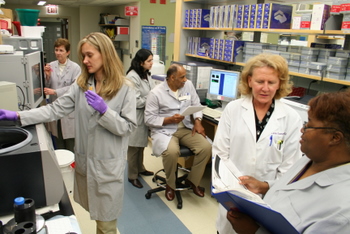Northwestern Hosts First Annual International Science of Team Science Conference April 22-24
 |
The Research Team Support (RTS) group of the Northwestern University Clinical and Translational Sciences (NUCATS) Institute will host the first ever Annual International Science of Team Science Conference April 22-24 in Chicago.
Team science is a discipline that studies interdisciplinary, team-based research, empirically examining processes through which teams organize, communicate, and conduct research. This includes understanding how teams connect and collaborate to achieve scientific breakthroughs that would not be achieved by either individual or simply additive efforts, and determining ways to define, track, and measure their efficiency and success.
“Northwestern University is a champion of this emerging field of interdisciplinary study, which is why we decided to develop a yearly conference related to team science,” says Holly Falk-Krzesinski, PhD, research assistant professor, director of RTS at NUCATS, and chair of the conference.
The conference will feature thought-leaders from across the globe — individuals from various backgrounds and fields of study. Falk-Krzesinski hopes these researchers, including Daniel Stokols, PhD, a professor from the University of California-Irvine, and Kara Hall, PhD, a health scientist at the National Cancer Institute, who together coined the phrase “science of team science,” will elicit innovative ideas by leading panelists who will cover the following topics:
- Challenges related to the science of team science
- Collaborative dynamics of teams
- Network perspectives of teams
- Practice of team science and support from funding agencies
- Strategies for facilitating team science
- Emerging directions for the science of team science and science policy
- Workshop on basic methods of social network analysis for team science
Conference participants — investigators studying science teams, team science practitioners, data providers, knowledge management/social networking database developers, and representatives from federal funding agencies such as the National Institutes of Health — will learn more about the tools available to evaluate scientific teams and how to overcome the communication conflicts and costs associated with collaboration.
“Attendees will have the opportunity to see the empirical research on team science and catch a glimpse of the types of projects underway,” Falk-Krzesinski says. “We encourage people to share their work, gain feedback, and make connections with potential collaborators.”






